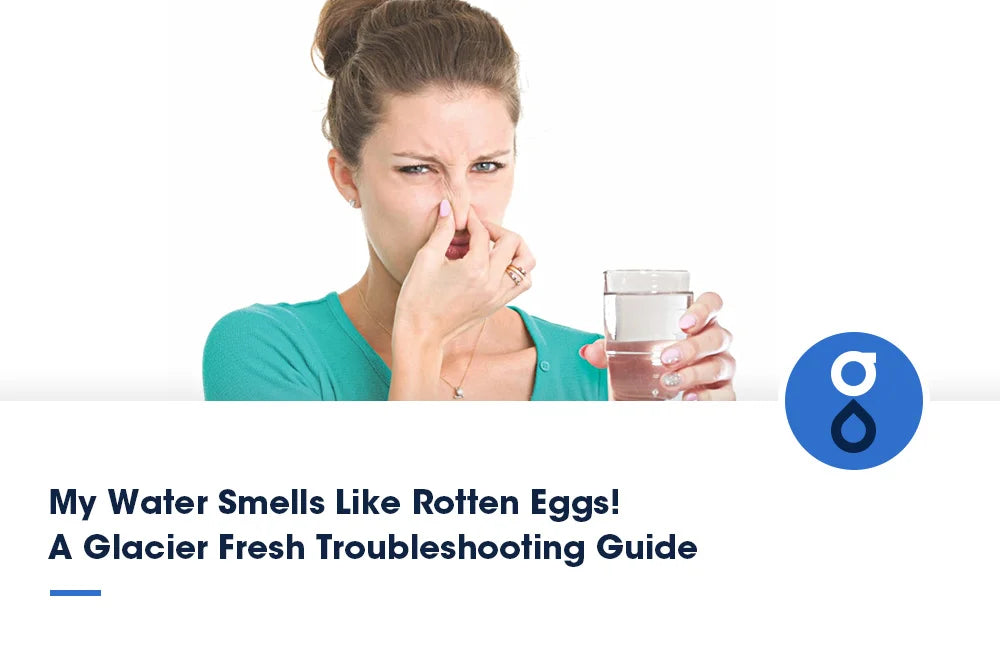Table of Contents:
Understanding the "rotten eggs" smell
Common causes of rotten egg odors in water
Step-by-step troubleshooting guide
Glacier Fresh`s remedies and solutions
Preventive measures and additional tips for rotten egg smells
Conclusion
Imagine turning on your tap only to be greeted by the foul stench of rotten eggs. This unwelcome aroma is often caused by hydrogen sulfide gas in your water. While generally harmless at low levels, it’s a nuisance that can signal underlying issues. Let’s dive into the causes and solutions to restore your water’s freshness.
Understanding the "rotten eggs" smell

Even at extremely low concentrations, hydrogen sulfide (H₂S) gas gives water a distinctive rotten‑egg odor. This gas can be produced by naturally occurring sulfur‑reducing bacteria (SRB) in groundwater or by chemical reactions within your plumbing system. In many private wells, organic matter decays under anaerobic conditions, fueling SRB that converts sulfates into H₂S. When H₂S dissolves in water, it releases that unmistakable scent as it moves through your pipes.
Common causes of rotten egg odors in water
Sulfate‑reducing bacteria in groundwater
SRB thrives in poorly aerated wells and piping, producing H₂S from naturally occurring sulfates.
A chemical reaction in water heaters
Magnesium anode rods inside water heaters can react with sulfates in the water, forming H₂S that only appears when hot water is run.
Decaying organic material in well casing or plumbing
Sediment or biofilm buildup in well screens and pumps can harbor sulfur‑oxidizing and sulfur‑reducing bacteria, contributing to H₂S production.
Clogged or poorly maintained drains
Sometimes, the odor you detect isn’t in the water but in the drain traps, where bacteria break down organic debris, emitting H₂S. Always rule out a drain-source first.
Step-by-step troubleshooting guide
1: Determine the source
Run both hot and cold taps. If only hot water smells, suspect the water heater (anode rod reaction). If only cold water—or both—smells, it’s likely in the supply line or well.
2: Flush the system
Run cold water at full flow for 5–10 minutes. Low‑use pipes can concentrate H₂S overnight, but flushing can often temporarily clear it.
3: Shock‑chlorinate your well and plumbing
Disinfect wells and faucets by injecting a strong chlorine bleach solution (shock chlorination). Chlorine oxidizes H₂S and kills sulfur bacteria.
4: Raise the water heater temperature
Increase the water heater thermostat to at least 160 °F (71 °C) for several hours, then flush out the dead bacteria. Lower the temperature back to 120 °F to avoid scalding.
5: Replace the magnesium anode rod
If hot water is the culprit, swap the magnesium anode rod for an aluminum or zinc rod. This prevents the rod‑sulfate reaction that generates H₂S.
6: Install appropriate filtration or aeration
KDF‑85 media filters oxidize H₂S before carbon filtration and are ideal for low‑flow applications. Aeration systems inject air to convert H₂S to odorless sulfate, then filter out the precipitate.
7: Retest and, if needed, consult a professional
After treatment, test your water for residual H₂S levels. If odors persist, a water treatment specialist can recommend advanced solutions.
Glacier Fresh's remedies and solutions
Glacier Fresh offers a range of water filtration products designed to improve water quality and eliminate unpleasant odors, such as the rotten egg smell caused by hydrogen sulfide. Here are some of their solutions:
1. Gravity water filter systems
Glacier Fresh's gravity-fed water filter systems utilize high-quality activated carbon derived from coconut shells. These filters are designed to reduce chlorine content by more than 99%, improving the taste and odor of water. The gravity-fed design allows for use without electricity in various settings, including homes, camping, and RVing.
2. Glass water filter pitcher
The Glacier Fresh Glass Water Filter Pitcher combines style and functionality. It features a hand-blown, shatter-resistant glass design with ergonomic handles for easy pouring. Equipped with a dual filtration system—an ultrafiltration membrane and activated carbon filter—it effectively reduces 99% of chlorine, PFOA/PFOS, and coliform bacteria, enhancing the taste and smell of your water. This pitcher is excellent for those seeking a convenient, eco-friendly solution to improve their tap water quality.
3. Refrigerator water filters
Glacier Fresh provides various refrigerator water filters that are compatible with major brands like LG, Samsung, Whirlpool, and GE. These filters are NSF 42 certified and designed to remove chlorine and improve the taste and smell of drinking water.
By incorporating these filtration solutions, homeowners can effectively address and prevent the occurrence of rotten egg odors in their water supply.
Preventive measures and additional tips for rotten egg smells
· Annual well maintenance: Shock‑chlorinate your well and plumbing at least once a year.
· Regular anode rod inspection: Check water heater rods every 2–3 years; replace magnesium rods if you detect sulfur odors.
· Maintain proper aeration: Ensure deep wells have vents and that plumbing loops avoid dead‑legs where water can stagnate.
· Periodic filter servicing: Replace carbon and KDF cartridges according to Glacier Fresh’s recommended intervals—typically every 6–12 months.
· Annual water testing: Have a certified lab check for H₂S, iron, bacteria, and other contaminants to catch problems before odors return.
Conclusion
A rotten egg smell in your water is unpleasant but generally solvable. By understanding that hydrogen sulfide is the usual culprit, pinpointing whether the problem lies in your well, plumbing, or water heater, and applying targeted treatments (from shock chlorination to KDF or aeration filters), you can restore fresh, odor‑free water to your home. With Glacier Fresh comprehensive range of systems and preventive tips, you’ll be equipped to tackle sulfur odors now and keep your water clean and odorless for years.


















